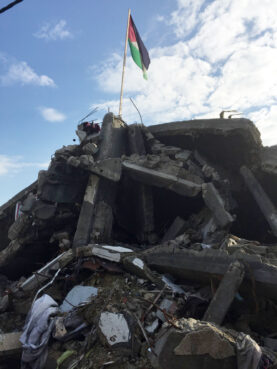(RNS) — I first traveled to Gaza in 2014 in the aftermath of Operation Protective Edge, a 51-day Israeli bombing campaign that killed nearly 2,200 Palestinians, the majority of them civilians. Walking the streets with fellow staff members of the American Friends Service Committee, our colleague pointed out empty spaces in the city blocks — sudden, square vacancies like missing teeth extracted by F-16s.
“This was the home of …. Up here was ….”
Entire families had been “surgically” removed. Walking farther, we found near-total devastation— concrete and rebar skeletons everywhere — some buildings speckled with dangling sheets or half rooms where those lucky enough to survive tried to maintain some semblance of life amid the wreckage. Children darted in and out of the precarious rubble.
We met over dinner with heads of clinics, human rights organizations, well-known doctors and professors. We learned later of the crushing losses each of these extraordinary people suffered over the summer. One woman lost 11 family members, another both his parents, another’s home was destroyed. We were dumbfounded that they could maintain any semblance of sanity, let alone speak with detachment about the situation.
“But this is Gaza,” our colleague reminded us with a shrug.
Media portrayals of Gaza are so devoid of humanity — and often facts — that it is unsurprising that the horrifying violence we saw take place on Oct. 7 has been spoken of as “unprovoked.” It is easy to forget our tax dollars — over $3 billion to Israel every year — have been directly supporting war crimes, sowing seeds of anger and war that will yield bitter fruit for generations to come.
In subsequent visits I have seen the crushing conditions of the Israeli blockade worsen, and a campaign of nonviolent protest largely ignored by the world. Trapped in a tiny strip of land they cannot leave, and with their economy brought to a standstill, Palestinians in Gaza experience collective punishment in nearly every dimension of their lives. Imports of materials to repair buildings and medical equipment after bombing campaigns are blocked by Israeli authorities. Electricity is available for shorter and shorter periods as Israeli restrictions have expanded. Safe drinking water is extremely scarce. Crushing travel restrictions leave over 2 million occupants trapped in a 365-kilometer area often referred to as an open-air prison. These conditions have been in place for more than 16 years.

A Palestinian flag stands amid the rubble of a destroyed building in Gaza in 2014. Photo by Aura Kanegis
Some of my ancestors were Lithuanian Jews. They knew desperation and death at the hands of people who had decided their very existence was a threat. And with that devastation comes a choice: Do we adopt a militarized vision of our own security and protect it at any cost — even at the price of others’ lives and rights? Or do we do everything possible to ensure no human being suffers again in this way? It has been my experience that the latter approach is not only morally stronger, but more effective — oppressed people will naturally struggle for their own well-being. If your strategy for security is to oppress another, that “peace” will be inherently short-lived.
Last week, Israeli Defense Minister Yoav Gallant said of the Gaza Strip: “There will be no electricity, no food, no fuel. Everything is closed. We are fighting animals, and we will act accordingly.”
Make no mistake: Such actions are not only war crimes, they are a total abrogation of one’s own humanity. Becoming monsters will not stop the monstrous destruction of violence and war — seeds of peace are planted in humanity, compassion and universal commitment to human rights for all people. We can never build peace by dehumanizing others.
The death toll in Gaza has already surpassed 3,500. A humanitarian disaster is unfolding, hundreds of thousands of people have been forcibly displaced, and a dangerous crisis of clean water and food shortages imminently threatens countless lives. Israeli airstrikes have reduced what remained of many neighborhoods in Gaza to rubble and have hit hospitals, schools, mosques, and water and sanitation facilities. Children go to sleep knowing they may not live to see another day; over 1,500 children have died already.
But the Israeli government does not commit these atrocities alone — U.S. tax dollars bought the weapons that destroy Gaza year after year. With $3.3 billion in military aid promised annually and more now being committed, we underwrite this devastation. And this investment has kept no one safe — the $260 billion we have sent to Israel since World War II has instead upheld an impossible, unjust and unsustainable suppression of an entire people’s human rights and fueled endless cycles of violence.
It is time for Congress to call unequivocally for a cease-fire and de-escalation in Israel and the Palestinian territories, and to back up that call with action. This week, a group of 13 House members led by Rep. Cori Bush introduced a Ceasefire NOW resolution and we are calling on all members of Congress to join them.
Rather than double down on failed strategies, it is time to end investments in war and occupation. It is time to throw our full weight behind a commitment to shared humanity and shared well-being. Congress, please stop using our tax dollars to buy endless cycles of war and violence — it is time to get serious about investing in equality, human rights and lasting safety for all people: Israeli and Palestinian.
(Aura Kanegis serves as director of public policy and advocacy for the American Friends Service Committee. Guided by the Quaker belief in the divine light of each person, AFSC works with communities and partners worldwide to challenge unjust systems and promote lasting peace. The views expressed in this commentary do not necessarily reflect those of Religion News Service.)





